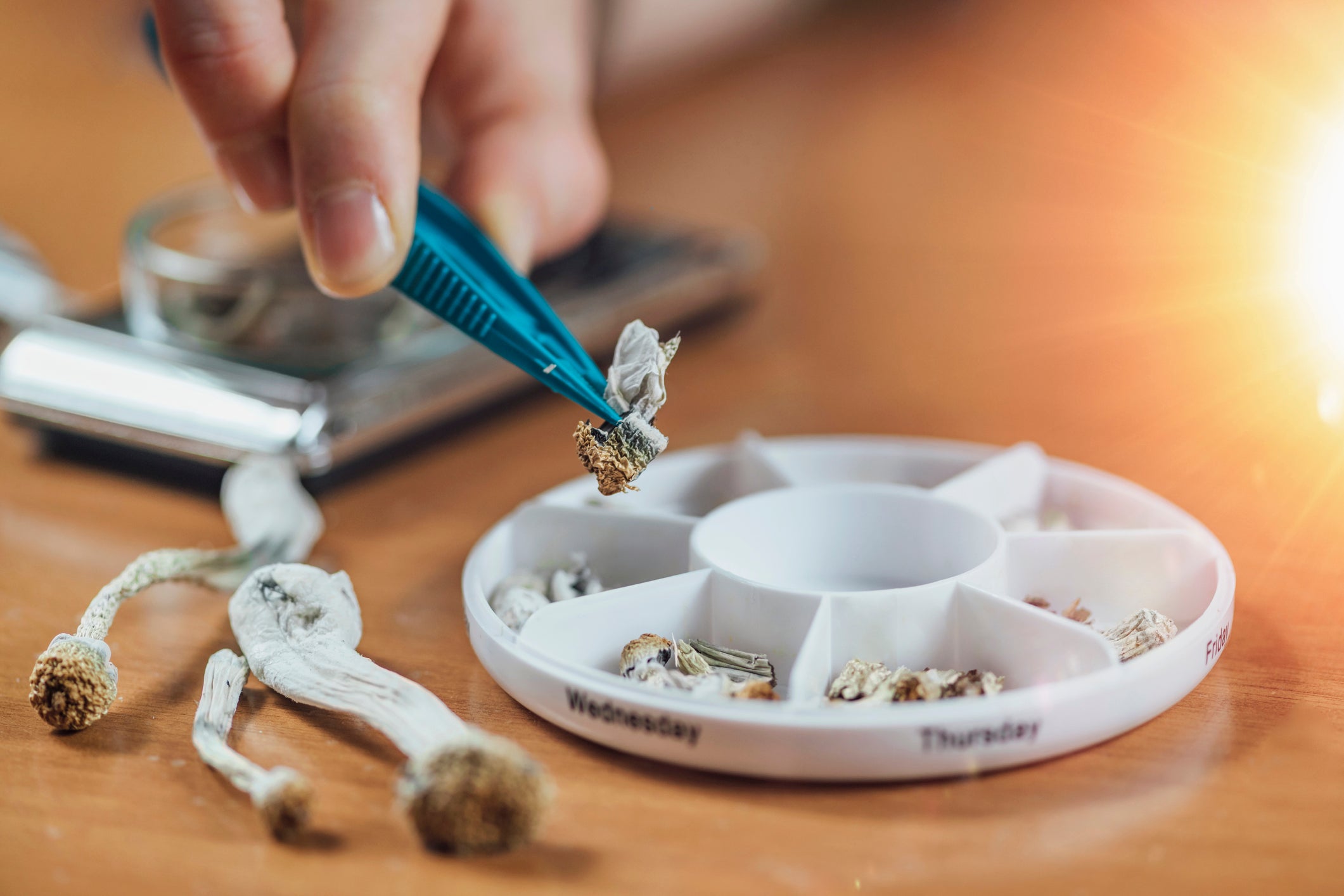‘I’ve experienced states of consciousness beyond this life’: The people turning to psychedelics on their deathbeds
Research from Johns Hopkins and NYU suggests that psychedelic drugs can significantly reduce pain and distress for those with terminal illnesses. As the British government faces calls to reschedule these substances, Kevin E G Perry talks to some of those who’ve already chosen to take the trip


Your support helps us to tell the story
From reproductive rights to climate change to Big Tech, The Independent is on the ground when the story is developing. Whether it's investigating the financials of Elon Musk's pro-Trump PAC or producing our latest documentary, 'The A Word', which shines a light on the American women fighting for reproductive rights, we know how important it is to parse out the facts from the messaging.
At such a critical moment in US history, we need reporters on the ground. Your donation allows us to keep sending journalists to speak to both sides of the story.
The Independent is trusted by Americans across the entire political spectrum. And unlike many other quality news outlets, we choose not to lock Americans out of our reporting and analysis with paywalls. We believe quality journalism should be available to everyone, paid for by those who can afford it.
Your support makes all the difference.Thomas Hartle is an unlikely psychedelics adventurer. The 53-year-old father of two from Saskatoon, Canada, describes himself as being “about as ordinary and boring as white bread.” Until a few years ago, he had never even considered taking any sort of illegal substance. “I grew up in the ‘This is your brain on drugs’ generation,” he tells me when we speak over a video call, referring to the notorious anti-drugs campaign launched in 1987 that featured that memorable slogan over the image of an egg frying on a skillet. “I considered that whole class of drugs as not just unhelpful, but as something that ruins people’s lives.”
In 2016, Hartle was diagnosed with stage four colon cancer. He went through multiple rounds of chemotherapy and radiation treatment, but the cancer returned in August 2019. Faced with the very real prospect of death, he decided to seek out new ways of coping. It was then he remembered research he’d come across online, published by Johns Hopkins Medicine in 2016, which suggested (via a small sample of 51 patients) that therapeutic use of psilocybin – the active ingredient in magic mushrooms – could help decrease depression and anxiety in patients with life-threatening cancer.
Last year, Hartle wrote to Canada’s Ministry of Controlled Substances to ask for a legal exemption to try psilocybin for himself. He was one of four patients in the country to be granted permission and became the first Canadian to legally experience a psychedelic therapy session on 12 August 2020. The results were immediate, and measurable. The day before, Hartle had registered 36 on the Beck Anxiety Inventory, on which any score above 25 is considered ‘severe anxiety’. The following day, using the same metric, he scored six, considered ‘minimal’. “I knocked 30 points off my standing level of anxiety,” says Hartle, “And that really lasted for a very long time.”
For Hartle, the benefits of psilocybin therapy went far beyond simply reducing his fear and anxiety over dying. He says he found the experience itself to be a profound one, and that it gave him new belief in the possibility of life after death. “My views on death have really changed tremendously,” he says. “Before, life after death was a sort of academic, intellectual concept, whereas now it feels tangible. I’ve physically experienced states of consciousness that have nothing to do with this life or anything that I would identify with ‘Thomas’.”
Hartle is not alone in reporting this kind of positive response. Laurie Brooks, a 53-year-old from Abbotsford, British Columbia, was another of the original group of four patients granted permission to try psilocybin therapy in Canada last year. She also has colon cancer, and in August 2019 her doctors told her she may only have six months to a year to live. It was then she became interested in psychedelic therapy. “If this was it for me, I didn’t want to be crying and depressed,” she says. “So I did my trip, and it was such a profound change. I went from feeling desperate, alone and grief-stricken to the next day feeling as if I were able to see my cancer in a box beside me on the floor. I felt in control, rather than it controlling me, and that made a huge difference. A lot of healing has come from that.”

Psilocybin was banned globally as part of the UN Convention on Psychotropic Substances in 1971, primarily for political reasons as psychedelics were considered a destabilising influence which threatened established cultural norms. Very little research was done into the potential of psychedelics for the next two decades, but since the early Nineties there have been a resurgence in clinical trials and the approach to psilocybin is now more lenient in some other countries. As well as the compassionate use allowances that gave Hartle and Brooks access to psychedelic therapy in Canada, several areas of the United States have already relaxed legislation around psilocybin. City councils in Denver, Colorado and Oakland, California have both decriminalised magic mushrooms, while in November last year Oregon became the first state to legalise the use of psilocybin for a two-year window for both recreational and therapeutic use.
Psilocybin is a Class A drug in the UK. It is also listed as a Schedule 1 drug under the Misuse of Drugs Regulations (along with substances like MDMA and LSD), which means it cannot be lawfully possessed or prescribed and that a Home Office licence is needed before it can be used in research. Despite the optimistic results of some recent research, sample sizes have been small. Although it is not considered an addictive drug, the potential for a “bad trip” remains, during which users may experience disturbing hallucinations, panic, delirium and psychosis. Some users may even experience Hallucinogen Persisting Perception Disorder (HPPD), often referred to as flashbacks, involving perceptual changes lasting weeks or months which can require medical attention.
But pressure is growing on governments around the world to allow greater research into psychedelic therapy in general. Campaigners like Conservative MP Crispin Blunt are calling for psilocybin to be moved to Schedule 2, which would enable the drug to be used in scientific and medical research. Last month, Mr Blunt called on Boris Johnson to “cut through the current barriers to research into psilocybin and similar compounds” in the UK.
In response, the Prime Minister said only that his government will “consider the Advisory Council on the Misuse of Drugs’ recent advice on reducing barriers to research with controlled drugs such as the one he describes, and we will be getting back to him as soon as possible”. British government pronouncements on this subject often resemble a classic Catch-22: They will allow further research only once further research has been done.
I’ve interviewed patients who have used psychedelics and what I hear from them is that it allowed them to talk about scary things
These developments have been welcomed by medical professionals like Dr Anthony Back, the director of palliative care at the Seattle Cancer Care Alliance and a professor of medicine at the University of Washington. Dr Back has spent years studying the way that doctors communicate with patients who are at the end of their lives, and believes the current system often fails both parties. After reading the psilocybin research from Johns Hopkins, as well as a similar study at NYU, Dr Back decided to investigate for himself.
“I arranged to have an underground experience with psilocybin. That experience made me think: ‘Wow! There is really something to this. It really is a game changer.” His own positive experience has been mirrored by the patients he’s spoken to. “I’ve now interviewed a bunch of patients who have used psychedelics, both in studies and underground, and what I hear from them is that it allowed them to talk about scary things,” he says. “Usually, our defences go up when we try to talk about these subjects. It turns out, unlike what our egos normally think, that actually we aren’t destroyed if we talk about death. In fact, something really important and even beautiful can happen.”

Dr Back offers some insight into how psychedelics are able to have such a transformative impact on brain function. One important aspect is that they physically reduce blood flow to what’s known as the ‘default mode network’. “The default mode network is where all of our stories about ‘me’ are created. ‘I’m the kind of person who likes this’, ‘I’m not the kind of person who does that’,” explains Dr Back. “What psychedelics do is disrupt all those usual little stories that we have about ourselves. All of a sudden, we’re able to make connections between things that are already in our brains but that aren’t usually connected. Psychedelics give you a window of time when you can make all these different connections that are outside of your usual habits of thinking.” This description rings true to Thomas Hartle, who offers a metaphor. “It’s the equivalent of fresh, fallen snow,” says Hartle. “Where all the old pathways used to be, there’s now this fresh covering.”
It’s the equivalent of fresh, fallen snow. Where all the old pathways used to be, there’s now this fresh covering
Part of the reason some doctors and patients are so intrigued by psychedelic therapy is that they believe it provides a form of treatment which conventional medicines simply can’t offer, as the San Francisco-based physician Dr Shoshana Ungerleider explains. “As MDs, when we see somebody anxious or distressed, we prescribe them medicine like a benzo [Benzodiazepines, drugs used to treat anxiety and depression] or an opiate to calm them down or dull their senses,” she points out. “We’ve been doing that for a long time, because those are the sorts of tools we have, but what that also does is blunt your ability to live fully and be present.”
Hoping to open conversations about the best ways to improve end-of-life care, Dr Ungerleider founded the non-profit End Well in 2017. She was so impressed by the potential of psychedelics to transform the field that earlier this month she organised The End In Mind, a virtual conference dedicated specifically to the use of psychedelics. “From my point of view, the power of these medicines is that we can not only reduce physical pain symptoms, but also the emotional distress that so many people have around this time of life,” she says, urging politicians like the Prime Minister to remove the barriers that still stand against further research. “I think we have an obligation as a society to really investigate this fully.”
Join our commenting forum
Join thought-provoking conversations, follow other Independent readers and see their replies
Comments